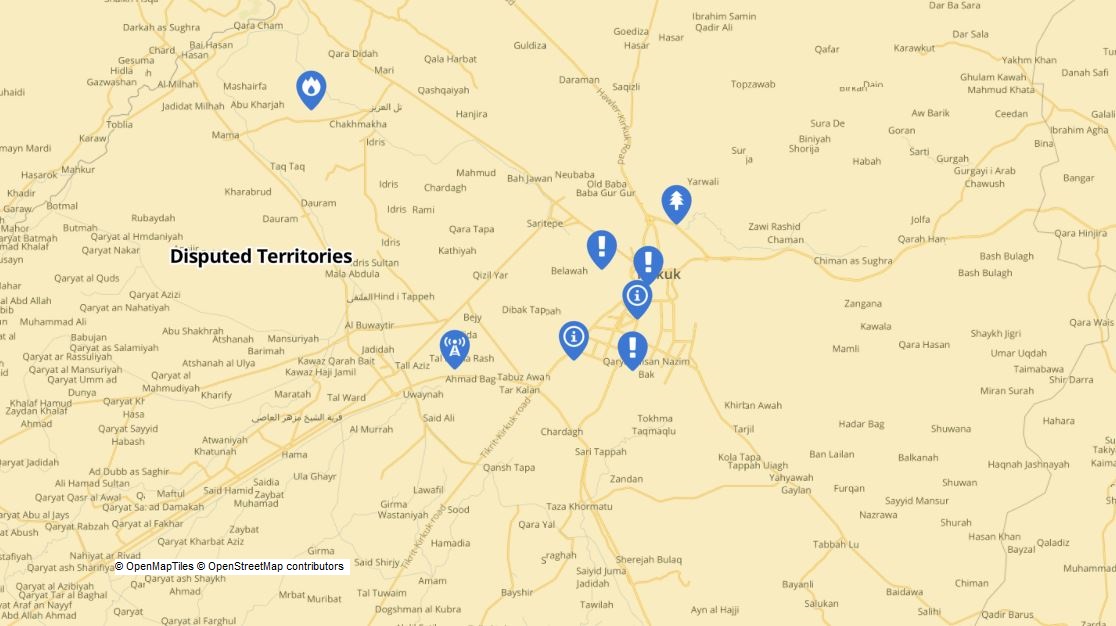1.3K
Kirkuk
- In another politically driven ruling, Kirkuk’s Criminal Court sentenced four former provincial council members to fifteen years in prison. The five were tried in absentia and officially charged with violating Article 340 of the Iraqi Penal Code, inflicting damage on government property. The Kirkuk Criminal Court accused the four members of possessing public property vehicles and not returning them. A joint statement by four former members described the court ruling as “political,” and they “have proved that their vehicles were taken away by Hashd al-Shaabi [Iranian-backed militias] on October 16th, 2017.” The members accused the court and Kirkuk’s administrations of not having authority over the militias resulting in political rulings against these members. On May 31st, the same court issued five years imprisonment against the former chairman of the provincial council, Rebwar Talabani, for similar charges. The convicted members participated in the independence referendum held by the Kurds in 2017, which Baghdad continues using as a pretext to crack down on the Kurds.
- On June 4th, the Kirkuk Civil Defense (Fire Department) reported that fourteen acres of crops were burned in Dibis and Daquq districts within 24 hours. According to the statement, a fire broke out in the villages of Kharabay and Bay Hassan in the Dibis district, burning 12.5 acres of wheat crops. The department said “an electricity shortage” caused the fire, “which brought it under control and saved 1,200 acres of land from burning.” In recent years, ISIS (Da’esh) terrorists set fire to thousands of acres of farmlands in both Iraq and Syria.
- The security forces announced the arrest of four Da’esh terrorists across the province, including a senior leader responsible for atrocities during the Yazidi Genocide.
- In an interview with the Iranian-backed Ahed channel, Rakan al Jabouri, the acting governor of Kirkuk, accused Peshmerga forces and the Kar oil company of “seizing three oil wells” near Lebenah village north of Kirkuk. Al Jabouri also said Arab and Turkmen representatives are against establishing a” coordination center” between the Peshmerga and the Iraqi forces inside the province. Al Jabouri has been imposed on Kirkuk as an acting governor since October 16, 2017.
- The Special Representative of the Secretary-General for Iraq and head of the United Nations Assistance Mission for Iraq (UNAMI), Jeanine Hennis-Plasschaert, visited Kirkuk and met with its imposed governor and several leaders of non-government organizations and activists. Plasschaert discussed the possibility of holding local elections in Kirkuk and addressed UMAMI’s efforts in “securing the requirements for the speedy return of the displaced to their liberated areas .”
- After nine years, Baghdad approved the construction of the Kirkuk green belt project, which was planned in 2014 by the former, Kurdish led administration, but at the time, the Ministry of municipalities refused to support the project due to a lack of “budget and financial crisis.” The project is to plant thousands of trees around the city–decrease the effect of dust storms and increase the green spaces in Kirkuk to more than its current 1%. Zuhair Ali, director of agriculture in Kirkuk, said Baghdad had approved the project, and the amount of three and a half billion dinars (2.2 million dollars) has been allocated for it.
- According to the State Grain Company in Kirkuk, wheat production has decreased by 47% since 2019. The company has received 65,000 tons of wheat and 10,000 tons of barley from farmers compared to 151 thousand tons in 2019. The total wheat production will be 80,000 tons and 17,000 tons of grain.
- After unanimous removal from the party leadership last month, the Turkish-backed Turkman politician Arshad al-Salihi plans to form a new party. According to local journalists, al-Salihi traveled to Turkey to win support for his new initiative. Disagreements between Salihi, an ultra-nationalist, and the current Turkmen Front leader, Hassan Turan, an Islamist, reached their peak last month. Turkey has served as life support for the Turkmen parties in Iraq since 1995.
Khanaqin
- According to a report by Shafaq News, 70% of farmers in Khanaqin are not willing to sell this year’s wheat production to the government but offer it to the market. The report addressed that lower government prices per ton of wheat, and delays in payments, discourage farmers from selling to the authorities. Some Kurdish farmers are yet to receive 2020 payments.
Tuz Khurmatu
- On June 5, Iranian-backed militias raided the Republic neighborhood in Tuz and arrested two Kurdish men, whose fate remains unknown. According to local reports, the two Kurdish men are former Pehsmergas and argued with a son of a militia boss.
- After the Turkmen Front congress last month and the takeover by the Sunni Brotherhood wing of its leadership, Shia members of the Tuz Khurmatu are angry and concerned about the changes. The new leadership plans to grant more posts and power to the Sunni Turkmen, making the Shias deflect and join Iranian-backed parties.
Shingal (Sinjar)
- On June 3, Ali Abbas, spokesman for the Ministry of Immigration and Refugees, said; The repatriation plan for the displaced Yazidis has not been implemented due to budget “obstacles.” He said,” as a government, we planned with international organizations to return the refugees by jointly allocating funds for this purpose, and to build houses and distribute them free of charge. However, there has been a lack of budget in Iraq this year and international organizations have faced a financial crisis and can not participate in returning displaced Yazidis to their homes.” According to the spokesperson, the Russian invasion of Ukraine has also made international organizations lose funds in Iraq.
.

